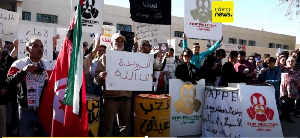Sogakope (V/R), Nov. 28, GNA - The Kpong Dam is under serious threat following an increase in aquatic weeds on the Volta River. Seventy per cent of the water column stretching from Amedeka to Azizanya in the Lower Volta Basin has also been covered, constraining economic activities in the Lower Volta districts. This has resulted in a high prevalence rate of between 20 and 48 per cent of bilharzia cases in the area, since the weeds provide breeding grounds for snails which host bilharzia.
To reverse the trend, the Government and the African Development Bank have provided 2.5 million dollars for the commencement of a project to manage the weeds.
The loan has 320,000 dollars as grant, while government is providing over one million dollars.
Launching the project at Sogakope in the South Tongu District on Wednesday, Mr Jonathan A. Allotey, Executive Director for the Environmental Protection Agency (EPA), said the project was a regional approach between six members within ECOWAS and Mauritania. The ECOWAS countries are Ghana, Nigeria, Benin, the Gambia, Mali and Nigeria. Mr Allotey said the Integrated Management of Invasive Aquatic Weeds Project would employ mechanical, manual and biological methods to control the weeds and use it for production of compost for vegetable cultivation.
He said the weeds had also invaded between five to 30 per cent of water surface in the Volta River, adding that over 600 hectares of the Tano River representing between five and 50 per cent had also been affected.
Mr Maxwell Kofi Dwomoh, Deputy Minister of Local Government, Rural Development and Environment, said government's financial support demonstrated its commitment to assist riparian communities and help develop water resources for sustainable development. He said government was holding consultations with development partners to obtain more resources to acquire small waterweed harvesters to support the initiative. Mrs Jewel Kudjawu, Coordinator for the Project, said it would include capacity building for local communities to support it to achieve maximum success.
She mentioned non-participation from immediate neighbours of Ghana, high cost of weed removal and high weed regeneration rate as constraints to the success of the project. Mrs Kudjawu said the project hoped to clear at least 20 per cent of weeds. 28 Nov. 07
General News of Wednesday, 28 November 2007
Source: GNA












